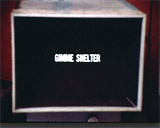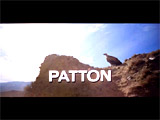
|
![]()
Greatest Films of the 1970s
1970 | 1971 | 1972 | 1973 | 1974 | 1975 | 1976 | 1977 | 1978 | 1979
Title Screen Film Genre(s), Title, Year, (Country), Length, Director, Description 


Airport (1970), 137 minutes, D: George Seaton
Writer/director George Seaton's predictable but suspenseful, blockbuster disaster-drama thriller was based on the 1968 best-selling novel by Arthur Hailey. (It was also derived from the plotline of The High and the Mighty (1954)). The entertaining 'popcorn' film's $10 million dollar production price-tag was well worth it - it grossed $100.5 million. There were ultimately four films in the 'Airport' franchise, including the sequels Airport 1975 (1974), Airport '77 (1977), and The Concorde - Airport '79 (1979). Airport's claim to fame was its jump-starting of "all-star-cast" disaster films, including The Poseidon Adventure (1972) and The Towering Inferno (1974). And the film also led to the successful spoof Airplane (1980) - marking the end of the disaster film sub-genre's popularity a decade later. The action involved a series of mounting problems occurring at the Lincoln International Airport (fictional) in the Midwest (presumably Chicago's O'Hare) and an ATC center, involving an imperiled 110-passenger Boeing 707's trans-atlantic flight to Rome during a major blizzard with frigid temperatures. There were many interconnecting personal stories of various individuals during a seven-hour period, including two romantic triangles. The airport's general manager Mel Bakersfeld (Burt Lancaster) was experiencing domestic issues at home involving his problematic marriage (and impending divorce) to his domineering, angry, spoiled and socialite-aspiring wife Cindy (Dana Wynter), while he struggled to keep the airport open. When one of the major runways was shut down due to a jetliner stuck in the snow, Mel called in TWA's tough-talking maintenance chief Joe Patroni (George Kennedy) to dig the disabled plane out and remove it. There were additional issues for Mel - he was in a relationship on the side with a widowed co-worker - Trans Global Airlines (TGA) passenger relations agent Tanya Livingston (Jean Seberg). And Mel's married brother-in-law Vernon Demerest (Dean Martin), a TGA pilot-captain with a faithful wife Sarah (Barbara Hale), was having an extra-marital affair that had led to the impregnation of his lover - pretty chief stewardess Gwen Meighen (Jacqueline Bisset). Meanwhile, inside the airport, a frequent elderly 70 year-old stowaway Mrs. Ada Quonsett (Oscar-winning Helen Hayes) from San Diego had been apprehended but then disappeared after being caught boarding a plane without a ticket. Meanwhile, TGA's Flight # 2 (a Boeing 707 airliner), with Vernon as the pilot and Gwen as a stewardess, had taken off from the airport for Rome. It was being co-captained by Anson Harris (Barry Nelson), and it was soon discovered that Mrs. Quonsett had made her way onto the plane. The suspense in the film was racheted up when one of the plane's passengers - disturbed demolitions-expert D.O. Guerrero (Van Heflin) and failed contractor, was suicidally planning to blow up the airliner over the Atlantic with a home-made bomb. His objective was to have his diner-manager wife Inez (Maureen Stapleton) collect the $225,000 insurance policy pay-out. When his plot was uncovered, the plane was turned back toward the airport without informing the passengers. During a botched attempt to apprehend the bomber Guerrero, the explosive device exploded in the plane's bathroom, killing Guerrero, eye-injuring stewardess Gwen, and creating a large hole in the plane's fuselage. Passengers were saved from rapid decompression when the oxygen masks dropped. The flight ended with an emergency landing of the crippled and damaged plane back at the airport, just after the blocked runway from earlier was cleared.


Beyond the Valley of the Dolls (1970), 110 minutes, D: Russ Meyer



The Bird With the Crystal Plumage (1970, It./W. Germ.) (aka L'Uccello Dalle Piume Di Cristallo), 98 minutes, D: Dario Argento


Claire's Knee (1970, Fr.) (aka Le Genou de Claire), (5th film in Six Moral Tales), 105 minutes, D: Eric Rohmer




El Topo (1970, Mex.), 125 minutes, D: Alejandro Jodorowsky
Argentinian director/star Alejandro Jodorowsky's film was a self-conscious, surrealistic, often incoherent and incomprehensible, unique and avant-garde film (translated "the Mole"). It was a strange variant of the 60s "spaghetti" westerns - both gory and spiritual - and the first 'midnight movie' film. Perfectly timed for its counter-cultural era of free love and cannabis freak-outs, it was up to late-night, 'midnight movie' viewing audiences to interpret the self-conscious, spaced-out and often incoherent and incomprehensible avant-garde cult film. It told the surreal story of the existential and spiritual quest, with Christian and Eastern philosophy symbolism, of a black-clad, violent gunfighting title character (the director himself). The film opened with El Topo riding in the Mexican desert with his naked son (Brontis Jodorowsky) on the saddle in front of him. In the startling opening sequence, they found the bloody remains of a town massacre where animals were gutted and people were decimated, leaving a river of blood. When threatened by three crazed evil-doer bandits, El Topo quickly dispatched with them, and then sought further vengeance in a mission town against the fat, balding (with a toupee), pasty-faced but vicious and sadistic Colonel (David Silva) and his outlaw gang. After castrating the Colonel (who then committed suicide) and executing his men, El Topo rescued the man's terrorized concubine-slave Mara (Mara Lorenzio) and rode off with her into the desert. She convinced him that for her to best love him, he had to prove himself by journeying onward to defeat and kill the "four great gun masters" who lived in the desert. Following the demise of all four adversaries and acquiring their wisdom, El Topo was betrayed by the 'Woman in Black' (Paula Romo), a whip-cracking bi-sexual gunslinger. In the second part of the film years later, a group of small-statured deformed cripples (exiled and outcast cave-dwellers) worshiped him as a god and savior, and expected him to free them. Simultaneously, El Topo appeared to have found enlightenment and holy "sainthood" and was born again. In a gun-blasting finale, El Topo shot all of the oppressive cultist clan members in a frontier town, and then immolated himself in the dusty street. A swarming beehive grave was constructed for El Topo's remains. The film ended as El Topo's grown son, his dwarf girlfriend and child rode off on the horse into the desert, mirroring the scenes in the film's opening.
Five Easy Pieces (1970), 96 minutes, D: Bob Rafelson
This existential, off-beat road movie and thoughtful, episodic and moody character study told about a classical concert pianist-turned-oil rigger, who was searching for his identity. He was compelled to reluctantly return home to visit his family in the cold Northwest. An alienated and misfit drifter, but talented musician-pianist Robert Dupea (Jack Nicholson) had abandoned his privileged, well-to-do family background, becoming the black sheep of his family as a crass, drifting, redneck, rough, beer-drinking oil-field worker in Southern California. The lonely, non-committed drop-out often took the "easy" route (usually denial, escape, or flight) from his discordant problems, career, and relationships with women, friends and family. After a period of twenty years, he confronted his past when he returned home to Washington State (Puget Sound) to his artistic, upper-class family and his dying father's deathbed, accompanied by his adoring but clinging, dim-witted, pregnant girlfriend Rayette (Karen Black). The existential film's most classic scene was Dupea's outburst while ordering a plain omelet with a side of toast (ultimately a chicken salad sandwich) in a roadside diner - symbolic of the 60s generation's anti-authoritarianism and alienation during the Vietnam War Era. His uncomfortable journey to see his dying father concluded in an open-ended, ambiguous way when he hitched a ride to nowhere and deserted Rayette.

The Garden of the Finzi-Continis (1970, It./W. Germ.) (aka Il Giardino Dei Finzi-Contini), 94 minutes, D: Vittorio De Sica



Gimme Shelter (1970), 91 minutes, D: Albert Maysles, David Maysles, Charlotte Zwerin


Investigation of a Citizen Above Suspicion (1970, It.) (aka Indagine Su Un Cittadino Al Di Sopra Di Ogni Sospetto), 112 minutes, D: Elio Petri



Little Big Man (1970), 147 minutes, D: Arthur Penn
Director Arthur Penn's serio-comic, revisionist Western was one of the best (and most successful) films of the 1970s. The anti-establishment, unconventional western depicted the inhumane treatment of Native Americans within its heavy-handed, fictional biopic tale (with the title character shuffling back and forth between Indian and white cultures). The daring film also served as a veiled criticism of Christian hypocrisy and a critique of the genocidal mistreatment of Native Americans (paralleling the My Lai Vietnam massacre in 1968). It opened with 121 year-old Jack Crabb (Dustin Hoffman) recalling his tall-tale epic exploits in the West to a skeptical historian-interviewer (William Hickey), and claiming to be the only white survivor of the Battle of Little Big Horn. Crabb surveyed his various incarnations - beginning as an orphaned and adopted Indian. Orphaned at age 10 with his sister Caroline (Carol Androsky), Jack was raised by Cheyenne Indians and fatherly Old Lodge Skins (Chief Dan George) after his pioneer parents were killed crossing the Great Plains. He acquired the nickname 'Little Big Man' during adolescence when he saved the life of Younger Bear (Cal Bellini) in a raid against Pawnees. Subsequently, he was seized by white men during a battle and raised by stern Rev. Silas Pendrake (Thayer Drake) and his sex-obsessed, seductive wife (Faye Dunaway). The saga continued as Crabb hawked patent medicines with snake-oil huckster-peddler Allardyce T. Merriweather (Martin Balsam) and became a gunfighter known as the "Soda Pop Kid." He rubbed elbows with contemporaries including gunslinger Wild Bill Hickok (Jeff Corey), married Swedish Olga (Kelly Jean Peters), and ran a haberdashery. Then after heading west, he scouted for the racist, pompous, and foolhardy Gen. George A. Custer's (Richard Mulligan) Cavalry unit, then deserted and traveled to the reservation led by now-blind Old Lodge Skins. Crabb fathered a child with Indian Sunshine (Amy Eccles). But then Custer's forces struck and only Jack and Old Lodge Skins survived the attack at the Washita River (set up as a criticism of the My Lai Vietnam massacre). Later, he became an alcoholic and a hermit, and was rehired by Custer as a scout. The vengeful Crabb was present when Custer's 7th cavalry forces were massacred by Cheyenne Indians at the Little Big Horn in 1876. He was saved when recognized by Younger Bear, and was reunited with dying Old Lodge Skins.

Love Story (1970), 99 minutes, D: Arthur Hiller


M*A*S*H (1970), 116 minutes, D: Robert Altman
Robert Altman's controversial, zany and satirical signature film (earning him the first of his five directorial Academy Award nominations, and one of his biggest, most-financially successful, and popular hit films), was well-known as the source of the long-running CBS-TV series (from 1972-1983). The countercultural, irreverent black comedy anti-war film took place at the 4077th Mobile Army Surgical Hospital (MASH) unit during the Korean War, a thinly disguised allegory for the unpopular Vietnam War that was raging at the time. The director capitalized on the current disenchanted mood about the insane conflict and - with idiotic black humor, poured on the blood and gore in the Mobile Army Surgical Hospital's operating room to illustrate the theme that "war is hell." Quick-cut editing, fast-quipped overlapping lines of constant dialogue, and the busy soundtrack made repeated viewings necessary. The film's characters in the ensemble cast became truly memorable, including three anti-hero surgeons: Captain Benjamin "Hawkeye" Pierce (Donald Sutherland), Major "Duke" Forrest (Tom Skerritt), and Captain "Trapper" John McIntyre (Elliott Gould). The hospital was mostly administered by psychic Corporal Walter "Radar" O'Reilly (Gary Burghoff, the only major cast member to star in the same role in the TV series), who was efficiently running the camp amidst the distracted absence of commanding officer Colonel Henry Blake (Roger Bowen). The two major foils (humorous objects of continual ridicule, cruelty and mistreatment) in the MASH unit included ultra-dedicated, self-righteous, strict and moralistic Major Frank Burns (Robert Duvall), and his love interest - sexy head nurse Major Margaret "Hot Lips" O'Houlihan (Sally Kellerman in an Oscar-nominated role). With little over-riding plot, the episodic and anarchic film with some improvisation basically examined how the wisecracking surgeons and other unit members irreverently dealt with the pressures, boredom and stupidity of wartime, by heavily drinking, womanizing, and engaging in pranks, hijinks, and anti-authoritarian behavior to retain their sanity. The irreverent surgeons terrorized Burns and "Hot Lips" by secretly broadcasting their love-making over the camp's loudspeakers in order to thoroughly humiliate them, and by exposing "Hot Lips" nude during an outdoor shower (while betting on her pubic hair color). She was furious and screamed at Col. Blake: "This isn't a hospital! It's an insane asylum, and it's your fault!" The unit members also saved the camp's well-endowed dentist "Painless Pole" Waldowski (John Schuck) from suicide (when he feared he was homosexual) by staging a Last Supper while singing the famous theme song: "Suicide Is Painless" and then providing him with Lieut. "Dish" Schneider (Jo Ann Pflug) to prove his virility. The film concluded with a climactic football game (with "Hot Lips" serving as the unit's head cheerleader) against the 325th Evac Hospital (who attempted to rig the game with a professional "ringer"). The M*A*S*H unit was able to score a victory in the final moments using a trick play.



Patton (1970), 170 minutes, D: Franklin J. Schaffner
The epic Best Picture-winning biopic war film (the winner of seven Academy Awards) was shot in 70 mm. widescreen color. It provided a survey of America's fiercest battle warrior - the controversial, bombastic, idiosyncratic, multi-dimensional World War II general and hero General George S. Patton (portrayed by George C. Scott). Patton temperamentally commanded his men on the battlefield, wrote poetry, believed in reincarnation, and offered anti-diplomatic criticism of the Soviet Union. The story was based on two books: Patton: Ordeal and Triumph by Ladislas Farago and A Soldier's Story by General Omar Bradley (portrayed by Malden). The unforgettable opening shot of the bigger-than-life screen biography was of fierce American General 'Old Blood and Guts' George S. Patton in front of an enormous red and white-striped US flag serving as a backdrop. He was addressing Allied US troops of the Third Army (off-screen) in a memorable, brilliant 6-minute pep-talk monologue to raise morale just before they were deployed overseas at the start of WWII. During the early years of the war in 1943, in the military campaign (the Battle of El Guettar) in Tunisia (North Africa) against Germany's Field Marshal Rommel (Karl Michael Vogler) known as "The Desert Fox," Patton's military genius was exemplified when his troops defeated the advancing German forces, and the Germans were expelled from N. Africa. They quickly annihilated and destroyed enemy tanks and infantry. Patton watched through binoculars at a nearby outpost, and exclaimed that he had used Rommel's own strategy against him in his book 'Infantry Attacks': "Rommel, you magnificent bastard! I read your book!" However, Patton often ran into resistance from traditonal or conventional military leaders, such as General Omar Bradley (Karl Malden). During plans for the invasion of Sicily in 1943 with the 7th Army to wrest it away from the Axis Powers, Patton was forced to work with the more cautious and ineffective British Field Marshal Sir Bernard Montgomery (Michael Bates), who Patton regarded as a hindrance rather than as a complement. On his own initiative, Patton demonstrated his winning philosophy by beating Montgomery to Messina (the island's main eastern port) with a lengthy pincer movement strategy (that took down Palermo along the way). Afterwards, the Italian leader Benito Mussolini was removed from power in Italy and the Allies were able to invade Italy. An Army field hospital incident nearly damaged Patton's entire career (he also missed out on D-Day in mid-1944 after being reprimanded and losing his command). He responded to a 'cowardly' combat-fatigued, shell-shocked soldier (Tim Considine) who whimpered: "I-I guess I just can't take it, Sir...It's my nerves, Sir. I-I just can't stand the shelling anymore." Patton was exasperated with the recruit: "Your nerves? Well, hell, you're just a God-damned coward" - Patton slapped the soldier back and forth with his gloves, and then ordered the doctors to not admit the patient. After Patton was reprimanded and demoted as punishment for his verbal abuse treatment and slapping of the fearful, battle-fatigued soldier, he delivered a very curt public 'apology' speech to assembled troops. The fearless, flamboyant, pugnacious and self-confident maverick Gen. Patton ran out of a meeting mid-stream in a headquarters building during an air raid (right after an Allied Air Force officer had bragged: "You will see no more German planes"). He stood in a street and bravely fired his pistol at German planes strafing the area. Under Patton's leadership, the Third Army swept brilliantly across France. He dramatically rescued the trapped 101st Airborne under siege at Bastogne during the Battle of the Bulge. Then he swept into Germany - moving faster and covering more ground than any army in US history. Patton pushed his troops all the way to Czechoslovakia but was ordered to step aside to allow Montgomery and the Russian troops to wipe out the already defeated German army. Patton despondently displayed his arrogant power-lust as he confessed: "I love it. God help me, I do love it so. I love it more than my life." As the war ended on the battlefield, the outspoken Patton insulted and snubbed America's current ally Russia, and then unwisely compared the defeated Nazis to other US political parties. He was removed and relieved from command and delivered a sad farewell to his staff. In the film's conclusion after the war, Patton's voice-over recalled history. His words were delivered while he was walking his bull terrier Willie over the countryside. He spoke about a returning Roman war hero who was given a victory parade, and ended with the words: "all glory is fleeting."



Performance (1970, UK), 105 minutes, D: Donald Cammell, Nicolas Roeg




The Private Life of Sherlock Holmes (1970, UK), 125 minutes, D: Billy Wilder

Tristana (1970, Fr./It./Sp.), 95 minutes, D: Luis Bunuel


Woodstock 3 Days of Peace & Music (1970), 184 minutes, D: Michael Wadleigh



Zabriskie Point (1970), 112 minutes, D: Michelangelo Antonioni
Italian director Michelangelo Antonioni's simplistic and failed view of 1960s America was an iconic and controversial, anti-Establishment and counter-cultural movie. It was the director's first (and only) US film, and his second English-language film following Blow-Up (1966, UK). The dramatic road-trip plot, that came out the same year as the Woodstock Festival, starred two disconnected and disillusioned young people (portrayed by two unknowns) in their debut film. Some have considered the anti-establishment and anti-materialism movie about dehumanization as one of the worst and least cohesive films ever made, with its romanticized, revolutionary and over-simplified view of reaching utopia. Others regarded it as a cult classic and a perfect 'time-capsule' from its time period, including its Pink Floyd, The Grateful Dead, and The Rolling Stones soundtrack. It was an embarrassing financial box-office disaster for MGM, due to its low revenue of approx. $1 million, on a budget of $7 million. In the film's storyline, a white rebellious youth named Mark (Mark Frechette), a radical and a revolutionary drop-out and drifter, became involved in the student protests and strikes occuring on an LA university campus. Mark observed as one black protestor ran out of an occupied building (misidentified as having a gun) and was blasted with a policeman's shot gun; as Mark was about to reach for his gun in his boot (and shoot the gun-wielding cop?), the offending cop was targeted and fatally shot and killed by someone else directly in front of him; Mark ran off from the scene, and was misidentified as a prime suspect. To escape from LA, he hijacked a small, pink-colored, single-engine 1967 Cessna 210 airplane (known as the Lilly 7) from the Hawthorne, CA airport, and headed eastward toward Phoenix. In another major plot strand, gorgeous, free-spirited blue-eyed Daria (Daria Halprin), an anthropology student, was hired to perform temp work as a secretary for a successful LA real estate tycoon/attorney Mr. Lee Allen (Rod Taylor). Mr. Allen headed up a land-development real-estate office that was making plans to construct a modern Sunny Dunes Estates resort in the Arizona desert, with lots-properties featuring swimming pools, tennis, a 9-hole golf course, private gardens, sunny and clear air and space away from the crowded "rat-race" of "miserable, crowded" city-life. Inexplicably, Daria was next seen on the road driving by herself toward Phoenix in a borrowed, 1952 gray, 2-door Buick sedan to meet up at a "conference" with Allen (who had plans to fly there) regarding the resort's development. During her journey, she was noticed by Mark in his small airplane, and after buzzing her, he landed and the two struck up an acquaintance, even though she had heard about the theft of a plane in LA on the radio. Distracted from her original destination, she drove off with Mark into the desolate desert and into an area of open landscape known as "no-man's land" of Death Valley, where they parked in an overlook at Zabriskie Point - the lowest point in the United States. During a period of self-exploration - and pot-smoking by Daria, the uninhibited couple began to kiss, undress each other, and make love on the desert sand dunes, to the tune of the Grateful Dead's Jerry Garcia playing "Love Scene" on the soundtrack; it was the film's most extraordinary sequence - an hallucinatory, symbolic, dust-swirling orgy or love-making sequence. Several dozen ash-covered copulating and kissing couples (and trios) (at least 100 phantom individuals, credited as the improv Open Theatre group of Joe Chaikin) magically appeared. Afterwards, Mark was anxious to return to Los Angeles by flying back and surrendering the hijacked plane - as he landed after his return trip, he was gunned down by LA police awaiting his return. Daria continued onward to Mr. Allen's luxurious, ultra-modern, maze-like desert dwelling built outside Phoenix. Already grieving Mark's death (she heard the news on the radio), she became distressed by the wealth, greed and empty opulence of the place and Mr. Allen's affluent cohorts. She impulsively drove off, but then parked at the end of the driveway. In the film's explosion-filled finale accompanied by a Pink Floyd soundtrack, she appeared to have an angry, anarchic wish-fulfillment hallucination, fantasy or dream - symbolizing the destruction of capitalistic excess; it was similar to Mark's revolutionary impulses, and to the previous orgasmic sequence in the desert. As the film concluded, she imagined the house being blown up in slow-motion (seen repeatedly exploding from almost a dozen different angles, using 17 camera set-ups); in addition, various materialistic consumer items were seen being destroyed and in extreme close-up (pool furniture, racks of designer clothes, a refrigerator with a cascading and disintegrating loaf of packaged WONDER bread, flying frozen chickens, a box of Special K, a banana, a TV set, and shelves of books); she literally observed or imagined the apocalyptic end of the materialistic and capitalistic America. The film ended as she drove away into the desert and an uncertain future (to the tune of Roy Orbison's "So Young"), as the camera panned over to view the golden rays of the sun as it set.